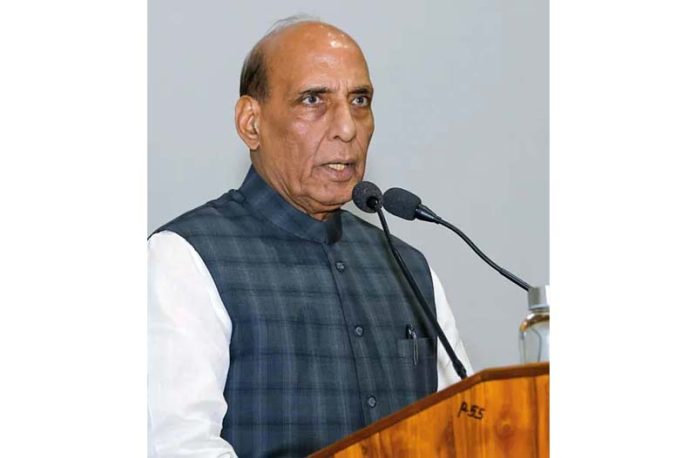NEW DELHI/PANAJI, Oct 30: The approach of ‘might is right’ has no place in maritime order and fair rules of engagement are crucial for fostering collaboration and ensuring that no single country dominates others, Defence Minister Rajnath Singh said on Monday in remarks seen as an oblique reference to China’s aggressive muscle-flexing in the Indo-Pacific.
In an address at the Goa Maritime conclave, he said “narrow immediate” interests may tempt nations to flout or disregard the well-established international law, but doing so would lead to the breakdown of civilised maritime relations.
Singh emphasised that common maritime priorities need to be addressed cooperatively by avoiding “selfish interests” that make the region less secure and less prosperous, adding that “adherence to international laws and agreements must be our lodestar”.
The defence minister, delving into challenges in the Indian Ocean region as well as in the Indo-Pacific, underlined the importance of respecting the international maritime laws as enunciated in the United Nations Convention on the Law of the Sea (UNCLOS) 1982.
“A free, open and rule-based maritime order is a priority for all of us. ‘Might is right’ has no place in such a maritime order,” he said in the presence of representatives of 12 countries.
“Our narrow immediate interests may tempt us to flout or disregard the well-established international law, but doing so would lead to the breakdown of our civilised maritime relations,” he said.
“Our common security and prosperity cannot be preserved without all of us committing to cooperatively adhering to the legitimate maritime rules of engagement,” Singh said.
He further added: “Fair rules of engagement are crucial for fostering collaboration and ensuring that no single country dominates others in a hegemonic manner.”
The three-day conclave that commenced on Sunday is being attended by representatives, including chiefs of navies and heads of maritime forces, from Comoros, Bangladesh, Indonesia, Madagascar, Malaysia, Maldives, Mauritius, Myanmar, Seychelles, Singapore, Sri Lanka and Thailand.
There have been growing global concerns over China’s sweeping claims of sovereignty over all of the South China Sea, a huge source of hydrocarbons. Several countries in the region, including Vietnam, the Philippines and Brunei, have counterclaims.
In his remarks, Singh also called for establishing multinational collaborative mitigation frameworks in the Indian Ocean region to effectively tackle common maritime challenges such as climate change, piracy, terrorism, drug trafficking, illegal fishing and freedom of commerce in high seas.
On climate change, Singh stated that the collaborative mitigation framework can involve the countries working together to reduce carbon emissions and transition to sustainable practices.
He pointed out that the world could overcome this problem if all countries accepted the responsibility to cut emissions by investing in a green economy and sharing technology and capital with needy countries. Singh also referred to ‘Illegal, Unreported and Unregulated’ (IUU) fishing as a challenge related to resource over-exploitation. “IUU fishing endangers ocean ecosystems and sustainable fisheries. It also threatens our economic security and regional and global food security,” he said. (PTI)
Several countries in the region are concerned over China’s illegal fishing in the Indian Ocean region. “A multinational collaborative effort for compilation and sharing of surveillance data is the need of the hour. It will help in identifying actors with irregular or threatening behaviour, which will have to be countered resolutely,” Singh said.
To put in place these mitigation frameworks, Singh identified collaboration and sharing of resources and expertise among nations.
He elaborated it further by explaining the difference between narrow national self-interest and mutual benefit based on the enlightened self-interest of all nations.
“The optimal outcome often involves cooperation and building trust among nations, but the fear of being taken advantage of or acting alone in a hostile world can lead to suboptimal decisions,” Singh said.
“The challenge is to find solutions that promote cooperation, build trust and mitigate the risks. We build trust through dialogues such as the Goa Maritime Conclave, joint exercises, industrial collaboration, sharing of resources, respecting international law, etc,” he said.
“Trust among cooperating countries would lead to optimal outcomes in respect of common maritime priorities,” he said.
In his address, Chief of the Naval Staff Admiral R Hari Kumar emphasised the changing nature of threats, both traditional and non-traditional and those emanating from the sea.
He added that the conclave offers a valuable opportunity towards developing effective mitigation strategies against such threats, thereby maintaining peace and securing growth in the Indian Ocean Region.
After his address, Singh visited the ‘Make in India’ stalls that have been set up at the venue to enable the visiting dignitaries of the 12 countries to catch a glimpse of the growing capabilities of India’s defence industry in indigenous manufacturing of state-of-the-art weapons, equipment and platforms.
The theme for the fourth edition of the conclave is ‘Maritime Security in the Indian Ocean Region: Converting Common Maritime Priorities into Collaborative Mitigating Frameworks’. (PTI)
Trending Now
E-Paper


